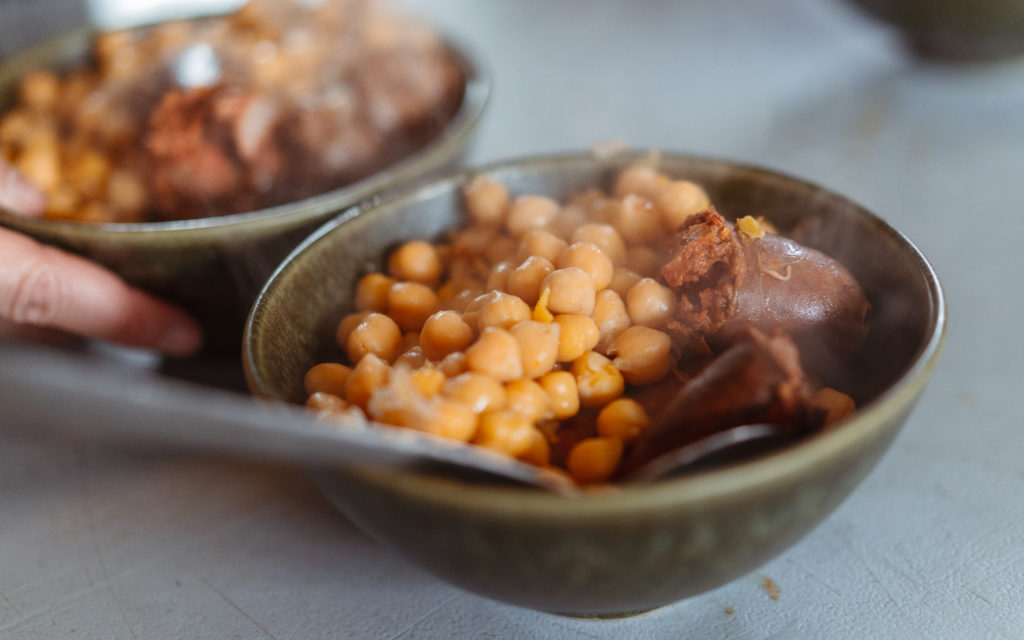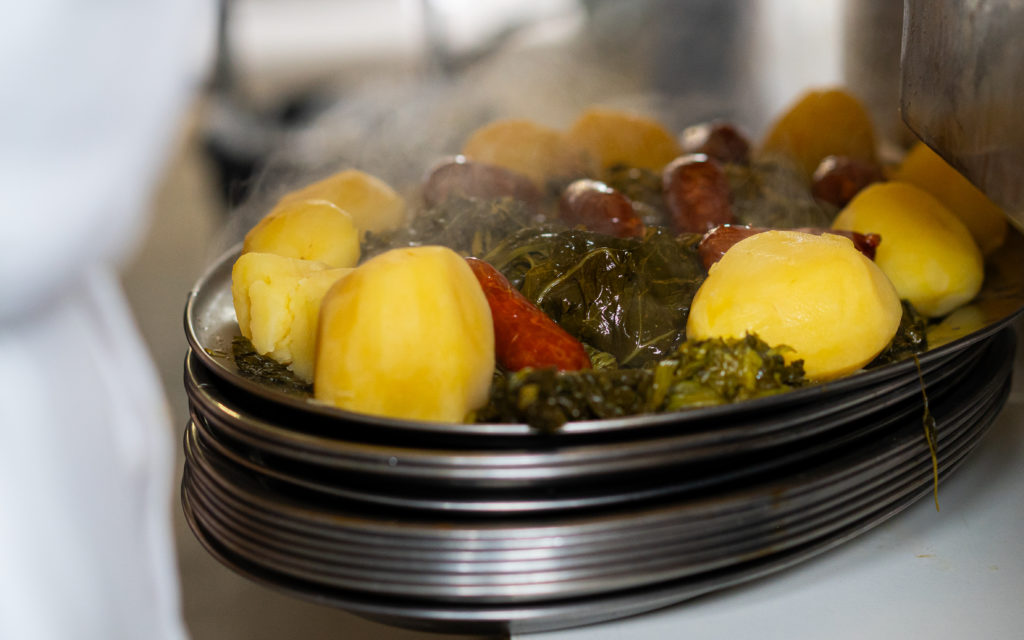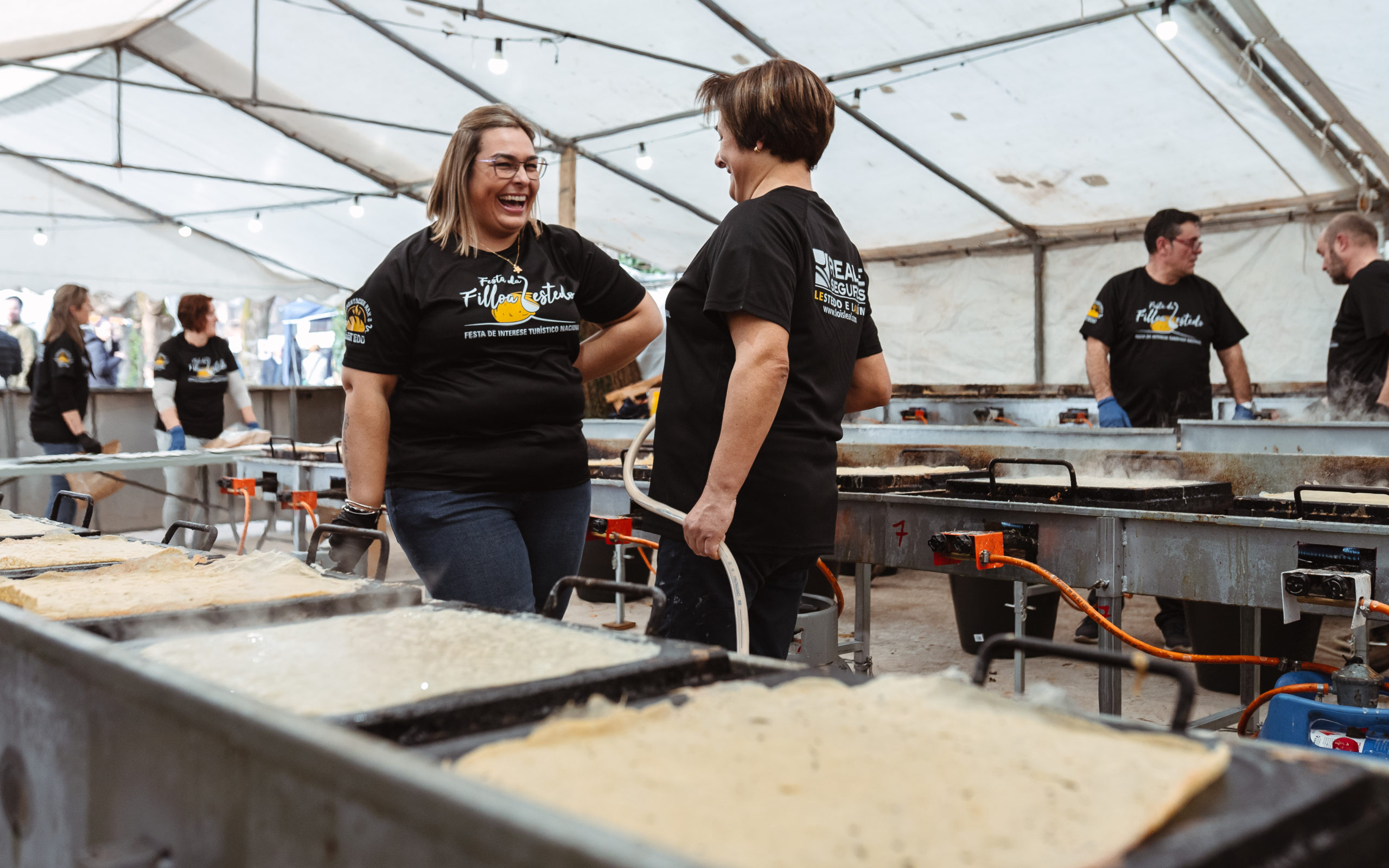‘Some eggs to Santa Clara and some filloas de Lestedo’. This is how the mayor of Boqueixón, Ovidio Rodeiro, justified that the storm Jana that yesterday forced to suspend the Carnival parranda and conditioned the celebration of the Filloa Folk, today had given a break so that the celebrations planned for the big day of the 42nd edition of the Filloa de Lestedo Festival could be held without incidents and without getting wet.
However, the day was very cold from the early hours of the morning, when at 8:00 a.m. the filloeira machines were turned on and were operational throughout the day. Filloas of all tastes, flavours and prices. Thus, the pack of 10 Lestedo filloas could be purchased for 5 euros; the stone-baked filloas were priced at 2 euros each and the pack of 3 gluten-free filloas could be purchased for 2 euros.
The filled filloas were a case apart. The sweet ones could be purchased for 2 euros, with a choice of filling: cream, chocolate or créemela. The savoury ones were priced at 3.5 euros and there were four options to choose from: the traditional ones with grilled chorizo or with sliced and toasted bacon, and the new ones with Celtic pork in kimchi sauce and pickled onion or sautéed with por el, mustard and honey.
Reception of authorities and Parade of Generals
From 12:20 p.m. onwards, the VIII Parade of Generals of the Ulla took place through the streets of Lestedo, the largest of these eight editions, bringing together more than sixty Generals, thirty of them on horseback, from Touro, O Pino, Santiago de Compostela, A Estrada, Vedra, Teo and Boqueixón. A dozen of them later took part in the traditional Atranques de los Generales that take place in the festival field after the proclamation.
A parade led by a group of bagpipes from the Maestro Manuel Gacio Cultural Association and by the official retinue, presided over by the mayor of Boqueixón, Ovidio Rodeiro Tato, and the president of the Filloa Cultural Association, José Manuel Canabal. With them, the Regional Ministers of Culture, Román Rodríguez González; Health, Antonio Gómez Caamaño; and Finance, Miguel Corgos López-Prado; together with the vice-president of the Diputación de A Coruña, Xosé Regueira Varela; and the mayor of Lalín, Xosé Crespo Iglesias. Also present were José Manuel Merelles Remy, director of the Galician Tourism Agency; María Alonso, president of the Galician Federation of Deaf People’s Associations; and Isabel Pichel, this year’s town crier.
Valentín García, general secretary of Language; Joaquín Macho, general technical secretary of the Regional Ministry of Employment; Martín Alemparte, director of the Galician Agency for Food Quality; Roi Fernández, director of Augas de Galicia; Encarnación Rivas, general director of Town Planning; Belén do Campo, territorial delegate of the Xunta in A Coruña; Mar Ferreiro, territorial director of the Regional Ministry of the Presidency; Begoña Freire, territorial director of the Regional Ministry of Housing; Juan Pedro Velázquez, chief colonel of the Military Aerodrome of Santiago; Francisco Francisco Francisco; Mar Ferreiro, regional director of the Regional Ministry of the Presidency; Begoña Freire, regional director of the Regional Ministry of Housing; Juan Pedro Velázquez, chief colonel of the Santiago Military Aerodrome; Francisco Antonio Torres, chief captain of the 3rd Company of the Civil Guard in Santiago; Esther Ordóñez, president of the Regulatory Council of the Miel de Galicia Designation of Origin; among other authorities, as well as the mayors of Vedra, Abegondo, O Pino and Oroso.
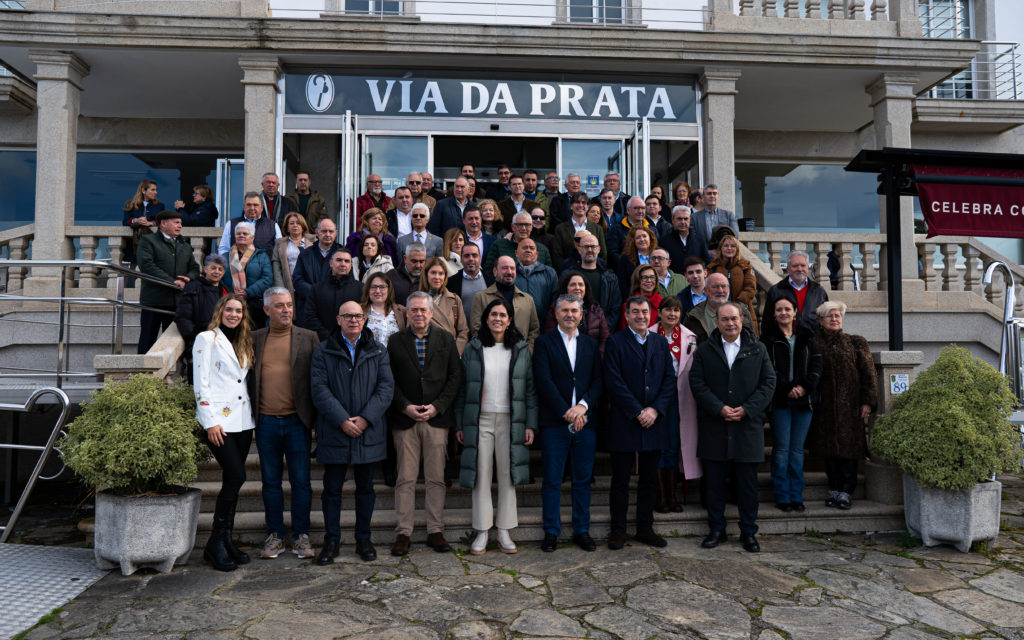
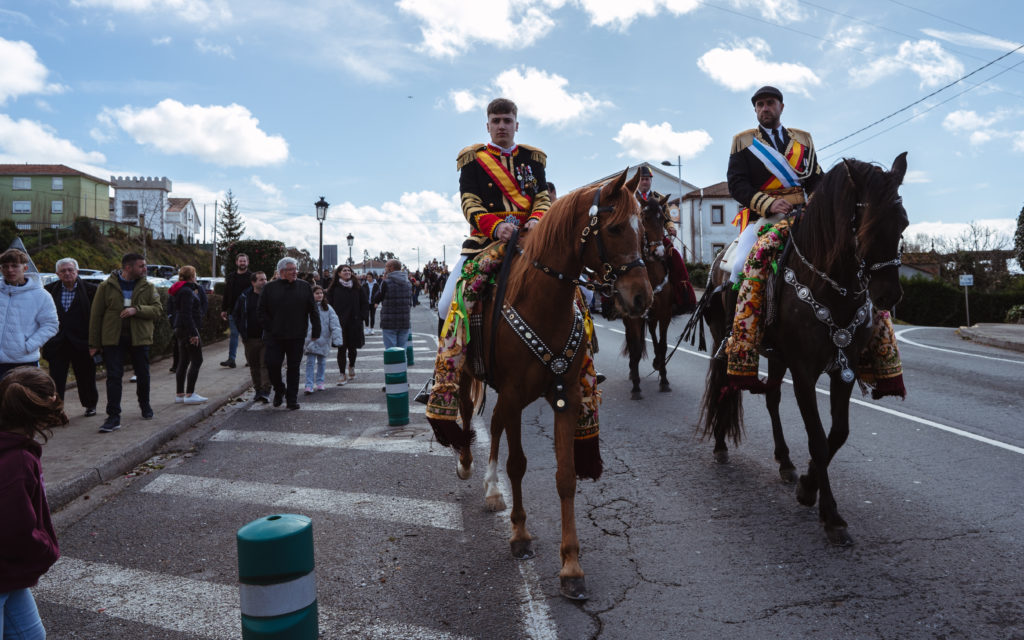
Opening speech and speeches
Ovidio Rodeiro Tato began the round of speeches by emphasising that ‘this year is the first edition in which we have been declared a Festivity of National Tourist Interest, for which reason I would like to congratulate the men and women of Lestedo who have been working for so many years to achieve this recognition’. He also thanked the Xunta de Galicia and the Diputación de A Coruña for their support.
He also recalled the recently signed twinning with the City Council of Lalín, ‘you cannot understand the stew without filloas or filloas without stew’, for which he thanked the mayor of Lalín for being able to count on ‘that big brother that is the Feria del Cocido, which represents for us a mirror in which to look at ourselves’. Finally, he joked about the weather and recalled that ‘Crespo said at the Cocido Fair that they took the eggs to Santa Clara because it hadn’t rained. This year we took the eggs and the filloas, and look how the weather changed. So if you have to take eggs to Santa Clara again, count on Lestedo’s filloas as well’.
For his part, José Manuel Canabal made an emotional speech recalling that ‘exactly one year ago I was in this same place telling that we were working for the Festival of the Filloa de Lestedo to be recognised as a Festival of National Tourist Interest. Today I am here to say that we have achieved it. To say that this festival of the parish, in which the neighbours made the filloas at home and then I brought them to the bars in this very square, was distinguished as one of the most important in Spain. For this reason, he thanked ‘first of all, the 242 people who are part of the Cultural Association of the Filloa. Thanks also to all the people who came before us, our fathers and mothers, our grandfathers and grandmothers, who kept this celebration alive for 42 years. Thanks to the neighbours of Lestedo because, as I said before, what is now a Festival of National Tourist Interest began as a small parish festival’. Finally, Canabal also thanked all the collaborating entities and administrations, as well as the companies sponsoring the Filloa Festival.
Isabel Pichel, a local resident and director of the Galicia por Delante Weekend news programme on Radio Gallega, began her speech by joking with the presenter, María Mera, about the more than 50 pages of her speech. He showed them to the audience, but they were not part of the speech, but the lyrics of the ‘Himno de Lestedo’, which was sung by all present at the beginning and at the end of the speech.
A very emotional speech in which Pichel recalled his origins and mentioned all the houses of his village of Pazos, to continue with the different villages of the parish of Lestedo involved in the elaboration of filloas. ‘I am Isabeliña who, like Balbino, is a village girl. From Pazos, from Lestedo, from Pico Sagrado, from Boqueixón’, began the pregonera who indicated that “I ate filloas, I eat them, I know how to make them and it will be like that for life”.
In this sense, she highlighted the value of living in Boqueixón, although she made one condition: ‘you will have to learn how to make filloas because this is a festival that we all have been doing for over forty years. That means that the neighbourhood is good and generous from generation to generation’.
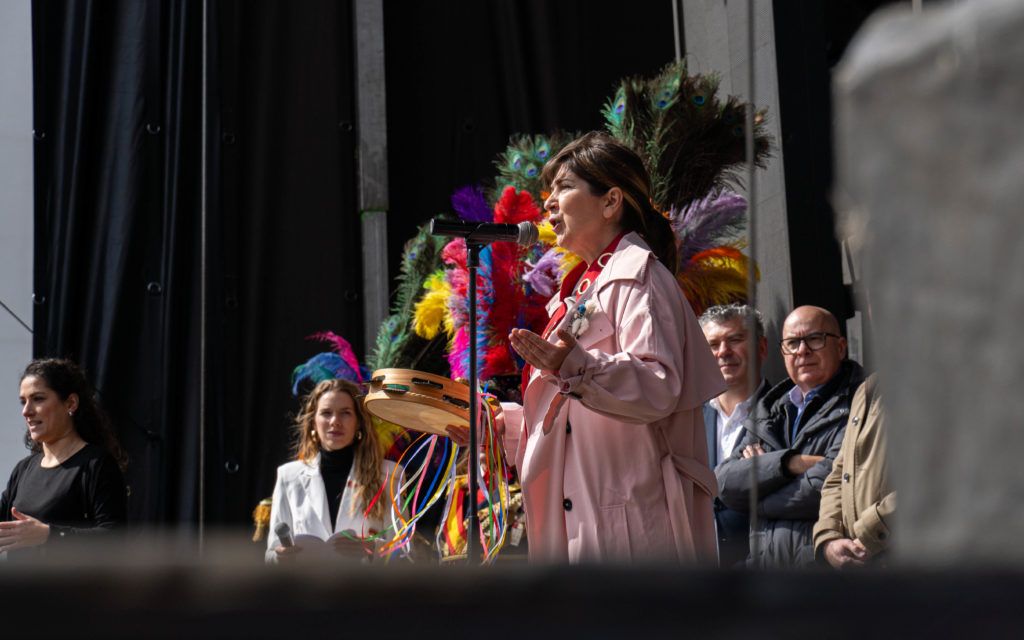
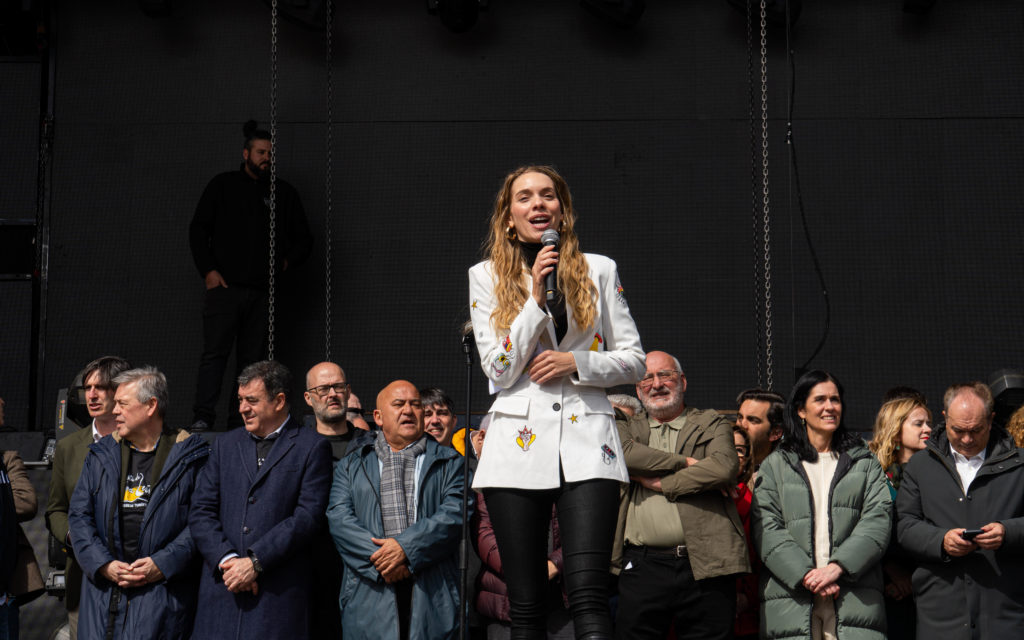
Aprons of honour
A town crier who was one of the six people distinguished this year by the Cultural Association of the Filloa with the imposition of the ‘Mandil de honra’ of the Filloa. Isabel Pichel received the distinction, designed by her cousin Carmen Pichel, from the Mayor of Boqueixón. Along with her, also honoured for their support and collaboration with the Filloa de Lestedo Festival were the Regional Minister of Finance, Miguel Corgos López-Prado; the Regional Minister of Health, Antonio Gómez Caamaño; the vice-president of the A Coruña Provincial Council, Xosé Regueira Varela; the director of the Galician Tourism Agency, José Manuel Merelles Remy; and the president of the Galician Federation of Associations of Deaf People, María Alonso.
The aprons were presented to them by José Manuel Iglesias Gómez, councillor of Treasury of Boqueixón; Román Rodríguez González, councillor of Culture and Education; José Manuel Canabal, president of the Cultural Association of Filloa; José Crespo Iglesias, mayor of Lalín; and José Luís Mareque Simón, councillor of Tourism, in the same order.
Xosé Regueira stressed that this festival ‘for me represents one of the best tourist products that we can have in the country. And the people of Lestedo were able to build this product of great value and give value to tourism throughout Galicia’, pledging to use the apron to continue making filloas in the house.
José Manuel Merelles stressed that ‘for us it is a satisfaction to have collaborated with the Cultural Association of the Filloa and the City Council of Boqueixón so that this festival can wear this title of Festival of National Interest. It is a festival that is born from the people and that puts in value our products’, as well as following the joke of the mayor of Boqueixón since “today I learned that making filloas de Lestedo is also very effective to open the sky”, so he also promised to make filloas in his house.
For her part, María Alonso expressed her gratitude for the distinction and the promotion of sign language, with an interpreter in recent editions of the filloa to facilitate the participation of all people in the festival. ‘Today this festival is a reference for many more’, concluded the president of the Federation of Associations of Deaf People of Galicia, applauding all those present in sign language.
Miguel Corgos López-Prado thanked the association, the City Council and the neighbourhood ‘for being the ones to maintain this beautiful tradition. I commit myself to spread this Fiesta de la Filloa de Lestedo’. Antonio Gómez Caamaño closed the speeches, thanking the apron because ‘I love cooking. There are people for whom it is a job, for me it is a rest’.
Once the ceremony was over, and with a few drops of rain, the traditional ‘atranques’ of the Correos and Generals took place, in which two couples of Correos and six couples of Generals took part, closing the party with a ‘atranque’ on horseback between General José Canabal and the actress and presenter María Mera.
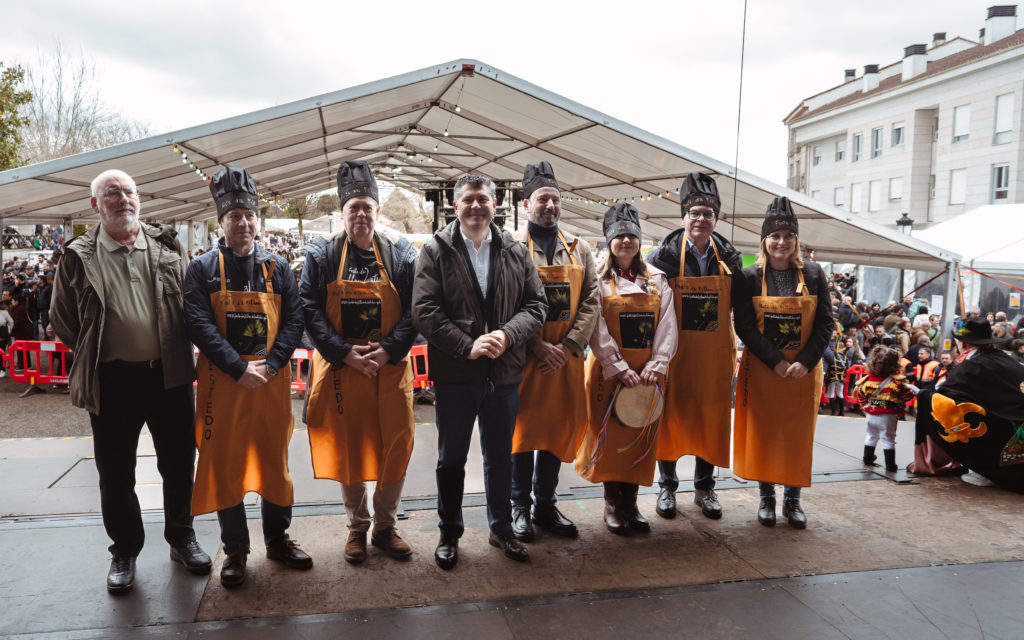
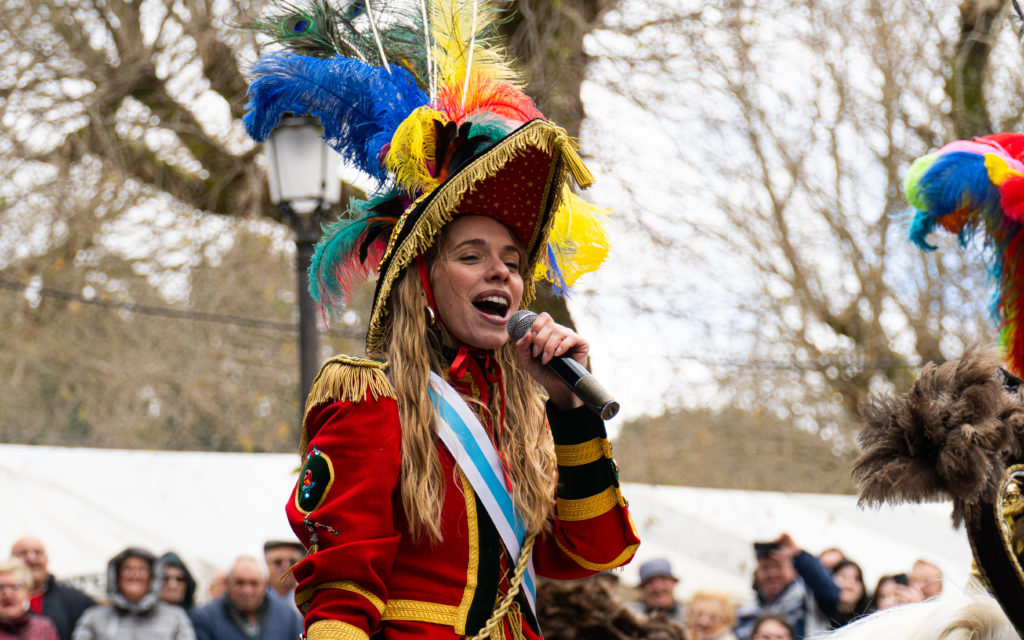
Cocido lunch
After the vermouth session, the traditional Filloa Stew Lunch took place in the sports centre of Lestedo, which on this occasion became the ‘Filloa Stew’ as a result of the twinning between the town councils of Boqueixón and Lalín. In total, around 300 lunches were distributed, prepared by the Lalín cook Álex Iglesias, which included a complete stew: stew soup, head, head, pork shoulder, rib, por el morro, ear, chorizo onion, nails, tail, turnip greens, potato, chickpeas and Galician beef brisket.
